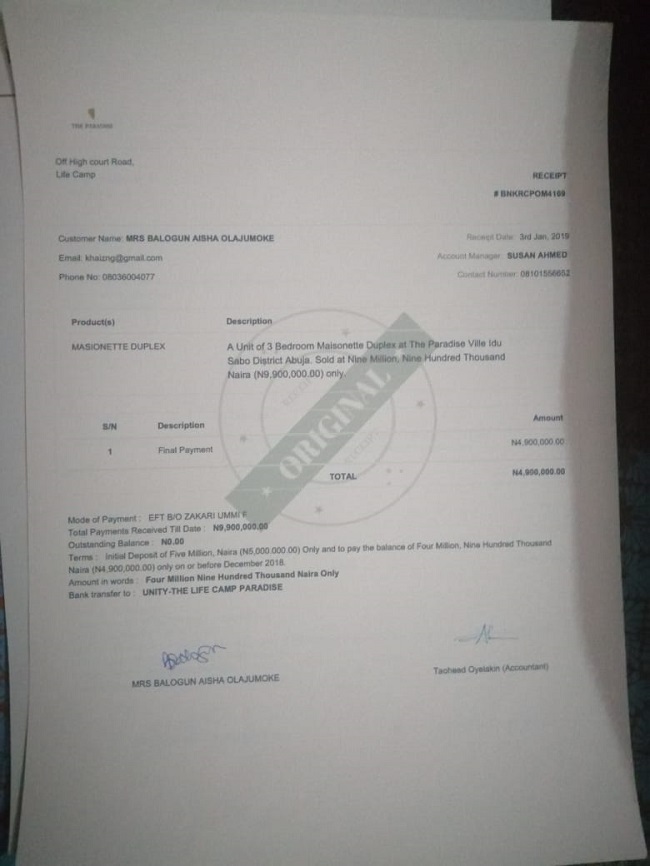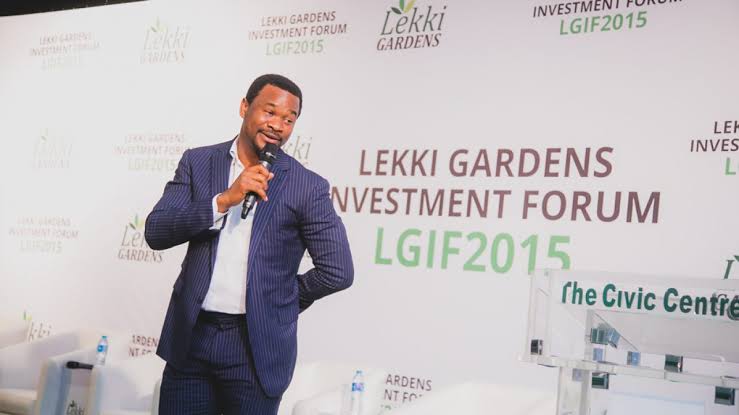...To get all news updates, Join our WhatsApp Group (Click Here)
Also Join our WhatsApp Channel (Click Here)
On September 17, 2018, Zakari Uthman and his wife Aishat walked up to the corporate office of Paradise Estate, Abuja, with the dream of owning a house.
Prior to the visit, the couple had visited one of the firm’s project sites at Idu Sabo, a suburb in the Federal Capital Territory (FCT).
Being a homeowner in the nation’s capital is mostly considered a rare feat and a lifetime dream for many residents.
The couple had spent over a decade paying high rents in a highbrow area of Abuja. So, it is only reasonable to want to seek an end to rent payment. They resolved to buy the property using the wife’s name, Aishat Olajumoke Balogun.
The couple eventually made a N5 million part payment for a three-bedroom Maisonette Duplex at the Paradise Estate in September 17, 2018.
The entire project cost was N9.9 million. And they were subsequently issued an offer letter to that effect.
Four months after, precisely January 3, 2019, the couple made the second tranche payment of N4.9 million.
These payments completed the total project cost. The project’s initial delivery date was scheduled for December 31, 2019, but it was later shifted. Now, the due date has been shifted more than five times in three years. And as of the time of filing this report, the couple was yet to get their property.
“…We have not only lost money that could have accrued on the mutual funds we liquidated at 12 per cent to quickly pay off the initial money but also took a facility at 27 per cent to complete the payment with the hope that by the end of 2019, we will no longer have to pay rent,” Balogun said.
On Friday, March 11, there was a footage of aggrieved clients who stormed the firm’s office to protest over issues regarding their land titles.

“Give us our money…we will make sure the world hears our cries. We don’t have money but we will continue to make noise for the world to know…they are 419ers.”
Also, four years earlier, in August 2018, the Association of House Owners and Residents (AHOAR), led by Samson Oche, held a similar protest against the same property firm owned by Lekki Homes. This time, the house owners protested over poor job delivery and non-issuance of house titles, among other concerns.
Some inscriptions read: “where is our title document Richard, we are tired of your deceits,” “Our roofs are giving way with the slightest rainstorm.”
“We have been promised for three weeks from the date of handover of our units to receive our title documents but three years down the lane, it’s been stories upon stories,” Oche said.
Ogbugo Ukoha was among the protesters. As of the date of demonstration, he had lived on the estate for more than a year but was more concerned about the land title. He told the News Agency of Nigeria the property kept selling despite having litigations hanging on the property.
He said the Federal High Court, Abuja had earlier issued a judgment against the Paradise Estate in favour of a third party, yet continued to sell to ignorant members of the public.
“The developer sold the property to everyone off-plan…surprisingly, after having paid, we discovered that they have been in court for the last, probably, five years during which he was selling and still assuring the owner of the place.
“By February, the FCT High Court gave a judgment against paradise having gotten this land through a third party, which means those of us who bought have been deceived into buying an asset we don’t own.”
Check shows that Ukoha is an Executive Director, Distribution Systems, Storage and Retailing Infrastructure at the Nigerian Midstream and Downstream Petroleum Regulatory Authority (NMDPRA). But, he could not be reached as of the time of filing this report to further find out if some of the concerns have been resolved as of date.
On Friday, April 8, this reporter visited his office at the NMDPRA but was denied entry access.
Meanwhile, full payment made by the aggrieved couple should have resulted in quick project delivery, rather Paradise Estate has repeatedly failed on its promised delivery date.
Apart from the original date set for December 31, 2019, the firm rescheduled to January 3, 2020, due to reasons such as the cost of building materials.
Zakari and his wife Aisha later met with the firm’s Managing Director Blessing Nyong-Essien, including another top official identified as Taofeek, a doctor. The couple was assured of the project completion by March 31, 2020, while the infrastructure would be fully sorted by May 31, 2020.
They became confident with the level of assurance after the meeting, that they paid the project’s Value Added Tax (VAT) of N495, 000 to the Federal Government, and notified the landlord of their intention to vacate their current building once the rent expired in May 2020. But it all ended in failure.
Another delivery date was set for July 2020 when the firm could not meet up with an earlier promise. It was further shifted to November 12, 2020; December 31, 2020; and, February 28, 2021.
This implied the couple was yet to get keys to the complete building over three years after payment.
“In the offer letter we were issued on September 14, 2018, it stated that our property will be delivered to us within 12 months which had elapsed by December 31, 2019, going by the payment dates,” a furious Aishat Balogun said.
“We visited the site on January 1, 2020, to ascertain the level of completion because the company lines [phone] were not going through, and we were disappointed with the state of progress.”
At this point, they demanded a refund since the firm had repeatedly reneged on its agreement.
Aishat reached out to a popular social media influencer who was consulted to amplify the estate project at the outset.
The complainant was shocked when the influencer advised she deploy whatever legal means necessary to get her project delivered or seek a refund.
“Based on the contract of sales, the house is to be delivered 12 months with a three-month grace period or four months in cases of force majeure. All these, I have graciously given. Then according to the contract, the buyer has the right to terminate the contract after two months of non-delivery and you guys would have eight months to pay me,” she wrote in a letter to the firm dated Monday, September 6, 2021.
“Even if I add all of these together, you have all grossly defaulted on all grounds,” she added.
On September 8, 2021, Eniola Olaoye, an official from the Client Services Unit responded to the mail announcing her allocation.
“Kindly find the attached letter with respect to the delivery of your allocated unit M3C Unit 1, Paradise Ville, Idu Sabo.”
Paradise Estate Limited’s last post on the social media platform (Facebook), as of the time of filing this report was on April 25, 2018.
Culled From ICIR….
To be continued……….
You can get every of our news as soon as they drop on WhatsApp ...To get all news updates, Join our WhatsApp Group (Click Here)
Also Join our WhatsApp Channel (Click Here)








